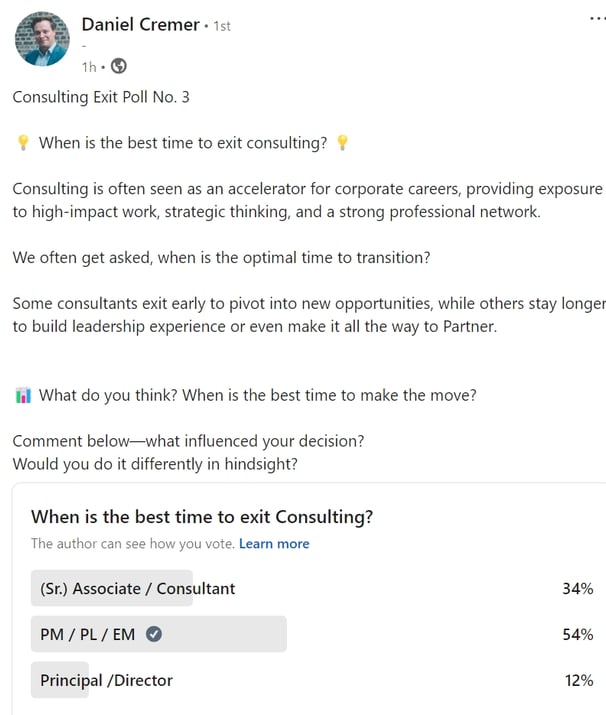When Is the Best Time to Exit Consulting? Insights from Industry Professionals
Consulting is widely regarded as a fast track to career acceleration, offering exposure to high-impact projects, strategic problem-solving, and a vast professional network. However, one of the most frequently debated topics among consultants is: When is the right time to transition out?
Daniel Cremer
2/5/20252 min read


My recent LinkedIn poll gathered insights from professionals on the ideal exit point in a consultant’s career. The results:
(Sr.) Associate / Consultant (36%) – Many professionals choose to leave at the early stages of their careers, leveraging their consulting experience to pivot into industry roles with a strong foundation in problem-solving and analytical skills. These individuals often enter corporate strategy teams, product management, or finance roles, where their consulting toolkit remains highly valuable.
Project Manager / Engagement Manager (55%) – The majority see mid-level roles as the best transition point. By this stage, individuals have developed strong leadership, client management, and execution skills, making them attractive hires for senior corporate positions. Many at this level move into general management, operations leadership, or strategic advisory roles in industry.
Principal / Director (8%) – A small percentage wait until they reach senior leadership, often securing executive positions in industry, private equity, or entrepreneurship. At this stage, professionals may have a clearer path to C-suite roles, but their exit opportunities are often more specialized and dependent on industry networks.
Key Factors Influencing the Exit Decision
Skill Development vs. Opportunity Cost
Many consultants leave once they’ve acquired critical skills but before the high demands of the role outweigh the benefits.
Staying longer may open doors to senior roles and higher earning potential in consulting, but it can also come at the cost of delayed career progression in industry.
Long-Term Career Goals
Those aiming for corporate leadership roles often exit at the Manager/Engagement Manager level to secure positions in strategy, operations, or business leadership.
Others who aspire to partner-level roles in consulting may choose to stay the course, maximizing their consulting experience before making an executive-level transition.
Compensation & Work-Life Balance
Consulting offers competitive salaries, but the trade-off often comes in the form of long hours and intense travel.
Some professionals leave early to gain industry-specific experience and a more sustainable lifestyle, while others maximize earnings and exit at higher seniority levels to secure executive packages.
Is There a Right Time?
Ultimately, the "right" time to leave consulting depends on individual career aspirations, market opportunities, and personal preferences. While the majority favor exiting at the mid-manager level, others find value in either an early departure to gain industry experience or waiting until senior leadership roles become available.
For those contemplating an exit, the key question remains: What’s your next move, and how does consulting align with that vision?
#Consulting #CareerTransition #StrategyConsulting #ManagementConsulting #CareerGrowth #ConsultingExit #Leadership #WorkLifeBalance #CorporateCareers #ConsultingLife
Connect
Partnering with you for exceptional leadership solutions.
contact@a-game-search.com
© 2024. All rights reserved.